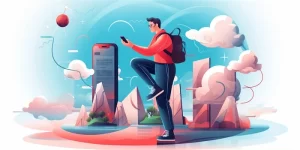Artificial Intelligence (AI) has been revolutionizing various industries, and the field of education is no exception. With its ability to process vast amounts of data and mimic human intelligence, AI is transforming the learning landscape in numerous ways. From personalized learning experiences to intelligent tutoring systems, let’s explore how AI is revolutionizing education.

1. Personalized Learning
AI algorithms are enabling personalized learning experiences for students. By analyzing individual learning patterns and preferences, AI systems can provide tailored content and recommendations. This approach ensures that each student progresses at their own pace, boosting engagement and comprehension.
For example, platforms like Khan Academy and Coursera utilize AI algorithms to identify knowledge gaps in students and offer personalized lesson plans.
2. Intelligent Tutoring Systems
AI-powered intelligent tutoring systems offer personalized feedback and guidance to students. These systems can analyze student responses in real-time, identify misconceptions, and provide targeted explanations. This personalized support helps students grasp complex concepts more effectively.
One such system is Carnegie Learning’s Cognitive Tutor, which uses AI to adapt to individual student needs and provide personalized instruction in mathematics.
3. Automated Grading
AI technology is automating the grading process, saving teachers significant time and effort. Machine learning algorithms can evaluate assignments, quizzes, and even essays, providing instant feedback to students. This allows teachers to focus more on providing meaningful instruction and support.
Tools like Gradescope and Turnitin utilize AI algorithms to automate grading and plagiarism detection, streamlining the assessment process.
4. Virtual Classrooms
AI-powered virtual classrooms replicate the traditional classroom experience online. These platforms facilitate real-time interactions between students and teachers, providing a collaborative and immersive learning environment. AI algorithms assist in maintaining engagement and ensuring equal participation for all students.
Platforms like Zoom and Google Meet utilize AI technology to optimize audio and video quality, detect and suppress background noise, and enable automatic transcriptions.
5. Adaptive Learning Platforms
AI is enabling adaptive learning platforms that dynamically adjust the instructional content based on students’ performance and understanding. These platforms use sophisticated algorithms to identify knowledge gaps and deliver targeted remediation, minimizing the risk of students falling behind.
MyMathLab and Smart Sparrow are adaptive learning platforms that use AI to guide students through personalized learning pathways.
6. Natural Language Processing
AI-powered natural language processing enables intelligent conversations between students and virtual assistants or chatbots. These systems can answer students’ questions, provide explanations, and offer additional resources. Natural language processing technology ensures seamless and efficient communication.
AI chatbots like Duolingo’s language tutors or IBM Watson’s virtual assistants are examples of how natural language processing enhances interactive learning experiences.
7. Data Analytics for Educators
AI-based data analytics allow educators to gain valuable insights into student performance, behavior, and learning patterns. These insights help educators identify strengths and weaknesses, tailor instruction, and implement effective intervention strategies.
Platforms like Brightspace and Blackboard Analytics provide educators with real-time data dashboards and predictive analytics to inform their teaching practices.
8. Gamification and Personalized Challenges
AI facilitates gamification in education, making learning more engaging and enjoyable. AI algorithms design personalized challenges and interactive experiences based on students’ abilities, interests, and learning goals. Gamification boosts motivation, encourages creativity, and enhances retention.
Platforms like Classcraft and Kahoot leverage AI to create gamified learning experiences that captivate students and foster a competitive spirit.
Frequently Asked Questions:
Q: Will AI replace teachers in the future?
A: While AI will play a significant role in education, it is unlikely to replace teachers entirely. AI systems are designed to enhance the teaching and learning process by providing personalized support, automating administrative tasks, and offering valuable insights. Teachers will remain essential for meaningful human connection, emotional support, and critical thinking development.
Q: Is AI biased in its decision-making processes?
A: AI algorithms can reflect biases present in the data they are trained on. It is crucial to ensure that AI systems are designed and trained with diverse and unbiased datasets. Regular audits and human oversight are necessary to minimize the impact of biases and ensure fair decision-making.
Q: Can AI cater to the individual needs of students with disabilities?
A: Yes, AI can cater to the individual needs of students with disabilities. AI-powered platforms can provide personalized accommodations, such as text-to-speech or closed captions to aid students with hearing impairments, or adaptive interfaces for students with motor disabilities.
References:
1. Carnegie Learning. (n.d.). Retrieved from https://www.carnegielearning.com/
2. Khan Academy. (n.d.). Retrieved from https://www.khanacademy.org/
3. Gradescope. (n.d.). Retrieved from https://www.gradescope.com/







